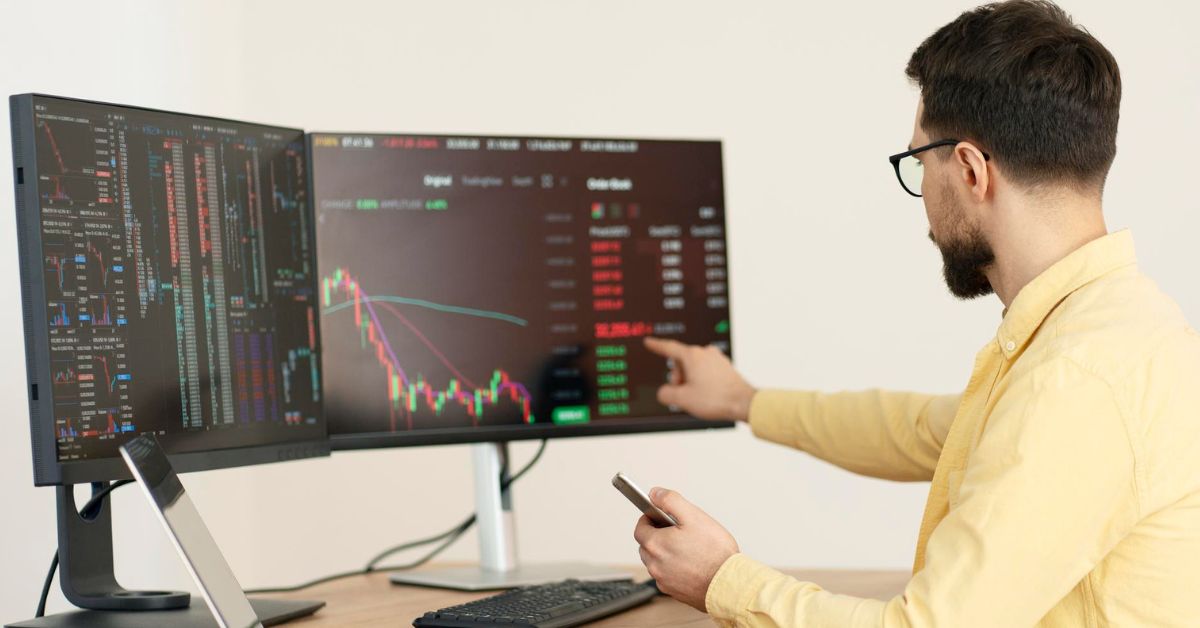Investing in financial markets is a psychological activity that requires discipline, strength, and resilience. A lack of mental toughness can lead even the most knowledgeable traders to make impulsive decisions. Therefore, this article will explore how to be mentally strong as a trader. Whether you’re a beginner or a pro, these insights will help you stay resilient and make more rational decisions.
Crypto trading platforms like Prime XBT provide tools and resources that can help you stay focused and disciplined. However, having the right platform is just one part of the equation. So, join PrimeXBT today! Use promo code PRIMEOTT to receive a +7% bonus on your deposit.
In order to succeed as a trader, you have to develop the mental fortitude to deal with the emotional highs and lows. Let’s take a look at the strategies to build and maintain mental strength as a trader.
What is Mental Strength in Trading?

Mental toughness is the ability to manage your emotions, stay focused, and stay disciplined under pressure. In trading, it involves staying cool when the market fluctuates, resisting the urge to act impulsively, and sticking to your plan even when things get tough.
A strong mentality isn’t about being emotionless; instead, it’s about knowing how to control your emotions. Remaining calm during market turbulence allows traders to make logical decisions rather than fearful ones.
The Impact of Mental Strength on Trading Performance
The importance of mental strength in trading cannot be overstated. Mentally strong traders can handle losses, view setbacks as opportunities to learn, and stay disciplined even during volatile markets. It helps traders stick with their strategies, manage risk effectively, and avoid common pitfalls like emotional trading.
Alternatively, impulsive decisions, inconsistent trading results, and financial losses can result from a lack of mental strength. So, market traders can improve their performance and achieve long-term success by building mental toughness.
Common Mental Challenges Faced by Traders
Trading involves not only understanding numbers and charts but also psychological endurance. It’s also common for traders to face intense emotional challenges that affect their decision-making. Here are some of the most common mental hurdles that traders encounter:
Fear of Loss
The fear of losing money is one of the most powerful emotions that traders face. It can paralyze decision-making, resulting in missed opportunities or premature exits from profitable trades.
If fear rules, traders won’t take necessary risks, resulting in stagnation and less growth potential. Managing fear means setting stop-loss orders or using risk management techniques.
Greed and Overconfidence
While fear can cause hesitation, greed can push traders into taking excessive risks. Investing in high-risk assets without proper analysis can lead to overtrading or overtrading. A streak of successful trades can lead to overconfidence, where traders start to think they can do no wrong.
If you adopt this mindset, you may ignore red flags, abandon your trading plans, and ultimately face significant losses. Balancing confidence with caution is key to avoiding the pitfalls of greed.
Stress and Anxiety

A fast-paced trading environment plus constant monitoring of the market can lead to high levels of anxiety and stress. Mental strain can cloud judgment, making it hard to think clearly and make rational decisions.
Chronic stress can also contribute to burnout by affecting trading performance and overall well-being. To manage stress, take breaks, practice mindfulness, and maintain a healthy work-life balance.
Impulsiveness
The challenge of impulse trading is common, especially during times of high market volatility. When traders react quickly to market movements, they can make hasty decisions that don’t align with their overall strategy.
It can lead to entering trades without proper analysis or exiting trades too soon, both of which hurt profitability. Developing discipline and sticking to a well-thought-out trading plan are essential to overcoming impulsiveness.
Loss Aversion
Loss aversion is the tendency to prefer avoiding losses over acquiring equivalent gains. This psychological phenomenon can make traders hold onto losing positions too long, hoping that the market will turn around.
The fear of realizing a loss can lead to even more significant losses as the market moves further against the trader. Maintaining long-term trading success requires knowing when to cut losses and move on.
Perfectionism
Traders who strive for flawless execution in every trade fall into the trap of perfectionism. It can lead to overanalysis, hesitation, and a constant fear of making mistakes.
Perfectionism can prevent traders from taking action, resulting in missed opportunities and frustration. Learning from mistakes and losses is more valuable than striving for perfection in trading.
How to Be Mentally Strong as a Trader
It’s essential to become mentally strong as a trader to navigate unpredictable markets. Long-term success requires traders to maintain discipline, make rational decisions, and handle stress. Here’s how you can build and strengthen your mental resilience as a trader:
Develop a Robust Trading Plan

A solid trading plan is the foundation of mental strength. With a well-defined strategy, you can stay focused and disciplined even when emotions are high. Your trading plan should include your goals, risk tolerance, entry and exit points, and rules for managing trades. Sticking to your plan reduces your chances of making impulsive decisions based on fear or greed.
Practice Emotional Awareness
Controlling your emotions begins with being aware of them. Traders who can identify their emotional triggers, whether they are fear, greed, or frustration, are better prepared to manage their reactions.
Mindfulness techniques can help you stay in touch with your emotions. You should pause before making any trading decisions. It will help you stay grounded and avoid emotional trading.
Build Resilience
Resilience is the ability to bounce back from setbacks and continue moving forward. In trading, losses are inevitable, but how you respond to them defines your success. Instead of dwelling on losses, view them as learning opportunities.
Analyze what went wrong, make adjustments, and keep moving forward. Maintaining a long-term perspective and not letting short-term losses derail your overall trading journey is vital to building resilience.
Stay Disciplined
Discipline is at the heart of mental strength. In other words, it’s the ability to stick to your trading plan, no matter how challenging the market conditions are. Discipline prevents you from chasing losses, overtrading, or deviating from your strategy.
One way to enhance discipline is to set clear rules and adhere to them without exception. You may need to place stop-loss orders, take profits at predetermined levels, and avoid impulsive trading.
Embrace Patience
Patience is a virtue in trading. The best opportunities often require waiting, sometimes for extended periods. Impatience can lead to bad decisions, like entering trades too early or closing positions too soon.
Embrace the idea that trading success is a marathon, not a sprint. The longer you wait and follow your strategy, the better your results will be.
Manage Stress Effectively
Trading can be overwhelming, but managing it is critical for mental strength. Include stress-reducing activities in your routine, such as regular exercise, meditation, or hobbies you enjoy.
It’s also good to take breaks during trading sessions to clear your mind. You need to keep your mind calm and focused to make rational trading decisions.
Set Realistic Goals
Setting realistic and achievable goals is essential for maintaining motivation and confidence. If your expectations are unrealistic, you will feel frustrated and disappointed, which will erode your mental strength.
Organize your long-term goals into smaller, manageable milestones. Be proud of your progress along the way and motivate yourself to keep moving forward.
Keep a Trading Journal
It is crucial to maintain a trading journal in order to build mental strength. Documenting your trades and your thoughts and emotions allows you to reflect on your decisions and learn from them.
Your journal can reveal patterns in your behavior over time, helping you identify areas for improvement. It also serves as a reminder of your progress and growth as a trader.
Learn to Let Go
One of the most challenging aspects of trading is learning to let go of losses, missed opportunities, and mistakes. Holding onto these negative experiences can cloud your judgment and hinder your progress.
Practice acceptance and learn to move on quickly. Every trader makes mistakes, but those who are mentally strong don’t dwell on them. Instead, they learn from them and focus on the next opportunity.
How to Build Long-Term Mental Strength as a Trader

Developing long-term mental strength as a trader requires a strategic approach that goes beyond short-term fixes. Here are some key areas to focus on:
Continuous Learning and Adaptation
Stay on top of market trends and refine your strategies to maintain your mental strength. Adaptability is vital; adjust your approach as market conditions change. The more you learn, the more resilient and flexible you’ll be able to navigate the markets.
Maintaining Work-Life Balance
Balancing trading with personal life is crucial to avoid burnout. Set clear boundaries between trading hours and personal time, and prioritize self-care activities like exercise, hobbies, and family time. Maintaining a well-rounded lifestyle keeps you energized and focused, which is essential for long-term trading success.
Building a Support System
A robust support system is vital for maintaining mental strength in trading. Join trading communities to share experiences, learn from peers, and connect with mentors for guidance. Emotional support from friends and family will make you more motivated and resilient.
Regular Self-Assessment
Regular self-assessment is essential for sustaining mental strength. Reflect on your mental and emotional state to identify stress or overconfidence. Early recognition of these feelings can help you make adjustments to your trading approach, ensuring you remain mentally resilient.
Read More: Trading Psychology: A Comprehensive Guide
Conclusion
Building mental strength as a trader is essential for long-term success in the financial markets. A robust trading plan, emotional awareness, and continuous learning can help you navigate trading these challenges.
If panic selling, FOMO, overtrading, and bag holding are keeping you from making money, try the Vestinda trading app. With this trading app, you will be able to eliminate emotional decision-making through automated crypto trading. Start controlling your trading journey now!



